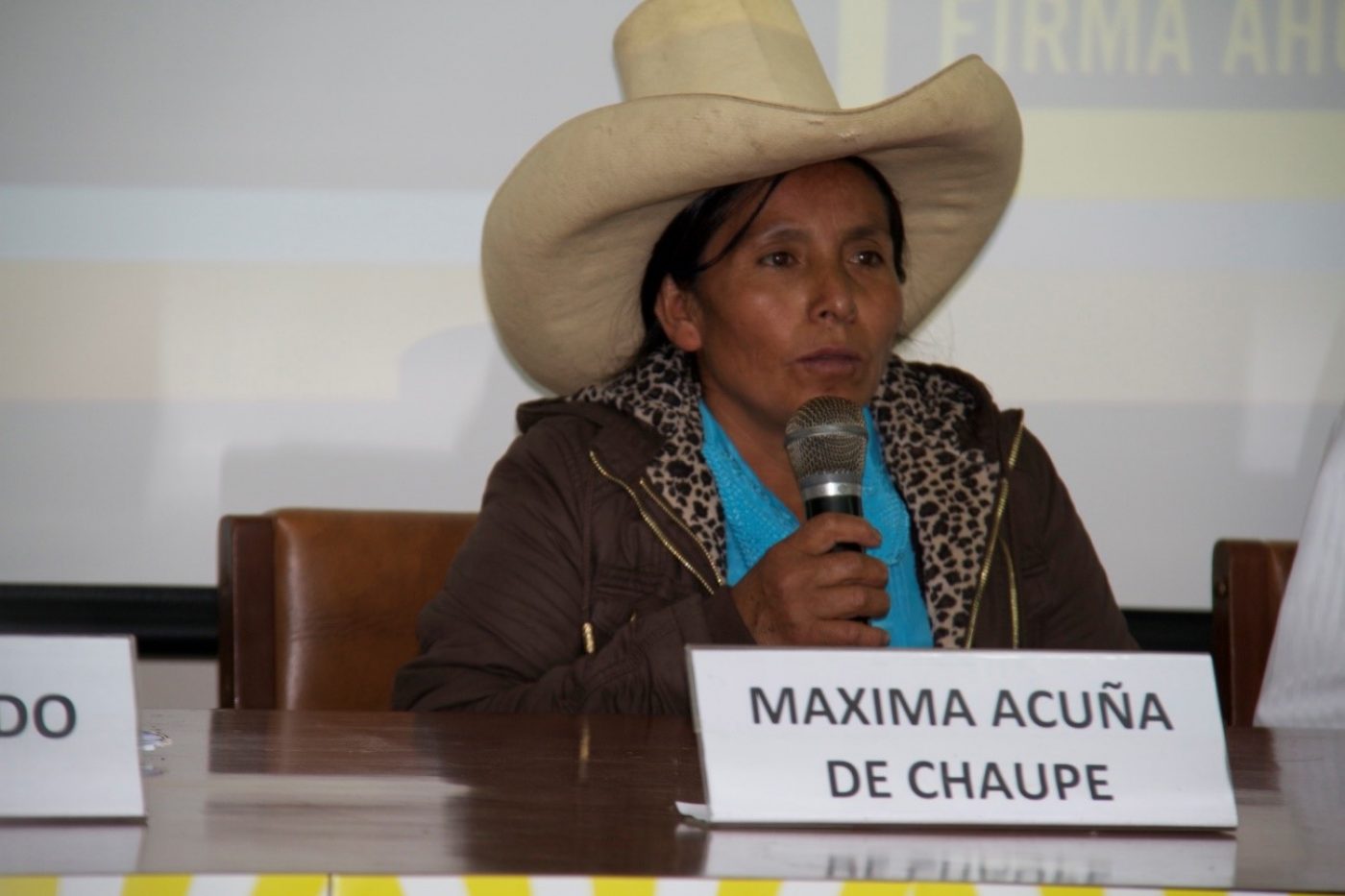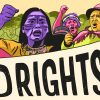December 5, 2016
(Article originally published by International Land Coalition)
As part of the #16Days of Activism Against Gender Based Violence, we are highlighting the work of women land rights defenders like Maxima Acuña, and the ways in which land rights are key for eradicating violence against women.
“I am a jalqueñita from the cordilleras, grazing my sheep in fog and rain. My dog barked, when the police arrived. My little huts they burned, my things they took away. Food I did not eat, just water I drank. Food I did not have, the straw was my only shelter. For defending my lakes, my life was almost taken. The engineers and Securitas guards stole my sheep, they drank broth in the Conga project camp. If this is goodbye, goodbye beautiful laurel, you stay at home, I’m going to suffer.” (Song played by Maxima Acuña when receiving the 2016 Goldman Prize).
Maxima Acuña has a firm look that denotes a great strength, gained in the daily struggle to defend her lands. Known as the Lady of the Lagoons, Maxima is a peasant woman from Cajamarca, in northern Peru. In 2016 she received the Goldman Prize, which is awarded to people who defend the environment despite the risks they face.
Maxima’s struggle, that takes place in Tragadero Grande, in the community of Sorochuco, is about defending her property. Located at 4100 meters, its ownership has been disputed since 2011 by the mining company Yanacocha, constituted by the companies Newmont Mining Corporation, Buenaventura and the International Finance Corporation. Yanacocha wants to develop the Conga gold mine in that locality, a mining project widely resisted by the people of Cajamarca due to the environmental impacts that it could provoke. The dispute arose because part of the project concession, that would also destroy four Andean lakes that supply water to the population of Celendín and Cajamarca, is on Maxima´s land.
“The lakes represent life and are considered sacred,” says Maxima when asked about the meaning of the lakes and their lands. “Well, we owe the lagoons the blood we have, the lagoons are like the veins on our body and are extremely valuable. We value our lakes because once they [the company] enter there to dry them, it would be as if they actually cut off our veins. That is how much we need them. We value our land because the Earth is the first thing that God gives to every human being in order to live.”

Maxima in her land next to the Azul lake. Photo credit: Daniel Chaupe
How did your struggle for the land begin and what threats are you facing because of it?
I am standing in the Conga project and my land is at the head of the basins of the lakes and Andean aquifers. I think about the future that is coming, I think about our children. If the company stays in Conga, it will destroy all nature. Our lands will be left deserted, the hills will fall. Our precious lakes and springs, the lakes that flow to the districts and provinces, will be all gone. We will no longer have clean water to drink. We will not breathe clean and pure air to live a healthy life. We will all come closer to our death because we will drink polluted water and breathe polluted air … for me it is a feeling of deep pain.|
How has the mining conflict affected you and your family?
I am the first woman from Cajamarca whose rights were violated by international mining companies and I am here to tell you what I am going through, and that this company really mistreats us. We are affected, both economically and at work, and our children in their studies. We have lost our health. We can no longer have peace and tranquility and that is why we become ill. This year, on 18th September, the company entered our lands with all its personnel and security guards to remove everything that I was growing in order to live. We are insulted and slandered by the media that the company uses. We are totally imprisoned. We have no freedom.
Do you believe that your struggle will help to ensure that the land rights of your people and your community are respected?
Yes. As human beings, we want peace and respect for our rights. My dream is to serve as an example to my children and my family, to my grandchildren, and also to the outsiders, to the youth and the children. To continue with courage, standing firm in the struggle to defend our rights. If we do not defend our lands, when the little ones become grown-ups later, they will not have the opportunity to enjoy those same lands and feed from our farm as we do today. Then they will ask: Why did this happen? Why did the mining companies destroy our place? Where are we going to go? Where are we going to live? They are not going to enjoy a healthy life, which is why we want to leave an example. I want to be the example for those children.

Maxima’s struggle, accompanied by men and women from Cajamarca and the whole country, as well as human rights organizations, indigenous organizations and other civil society organizations, has succeeded in ensuring that the judiciary declared her innocent of usurpation, which had been the claim made by the mining company. However, as she and her family remain at risk. Amnesty International is campaigning to defend her right to live in peace and protect the lakes that are part of the common goods of her people, because Maxima is not alone!
Interview by Rosa Montalvo Reinoso
(Main photo: Maxima talks to students at San Marcos University in Lima. Credit: Rosa Montalvo Reinoso)



